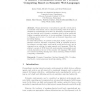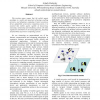128
click to vote
ICDCSW
2003
IEEE
15 years 7 months ago
2003
IEEE
Pervasive computing environments are characterized by an additional heterogeneity compared to existing computing infrastructures. Devices ranging from small embedded systems to fu...
101
click to vote
PERVASIVE
2004
Springer
15 years 7 months ago
2004
Springer
Abstract. Location-awareness is useful for mobile and pervasive computing. We present a novel adaptive framework for recognizing personally important locations in cellular networks...
116
click to vote
NLDB
2004
Springer
15 years 7 months ago
2004
Springer
Human interaction occurs always in a specific context and in a particular environment, and a common knowledge base about them is essential for understanding each other. By immersi...
126
click to vote
MDM
2004
Springer
15 years 7 months ago
2004
Springer
This position paper argues that the mobile agents paradigm is a useful and important technology enabling pervasive and ubiquitous computing. Context awareness drives adaptability ...
122
click to vote
CF
2004
ACM
15 years 7 months ago
2004
ACM
Aimed to provide computation ubiquitously, pervasive computing is perceived as a means to provide a user the transparency of anywhere, anyplace, anytime computing. Pervasive compu...
134
click to vote
SOCO
2005
Springer
15 years 7 months ago
2005
Springer
Due to the large success of wireless networks and portable devices, the pervasive computing paradigm is becoming a reality. One of the most challenging objectives to be achieved in...
119
click to vote
PERVASIVE
2005
Springer
15 years 7 months ago
2005
Springer
Abstract. Embedded assessment leverages the capabilities of pervasive computing to advance early detection of health conditions. In this approach, technologies embedded in the home...
146
click to vote
MIDDLEWARE
2005
Springer
15 years 7 months ago
2005
Springer
Service-oriented computing paradigm encourages the use of dynamic binding of application requirements to the resources needed to fulfill application tasks. Especially in pervasive...
122
click to vote
MIDDLEWARE
2005
Springer
15 years 7 months ago
2005
Springer
The vision of pervasive or ubiquitous computing, conceived by Mark Weiser, foresees a world where computing is embedded in every day objects. Such objects interact with each other...
120
click to vote
CRYPTO
2005
Springer
15 years 7 months ago
2005
Springer
Forgery and counterfeiting are emerging as serious security risks in low-cost pervasive computing devices. These devices lack the computational, storage, power, and communication r...



